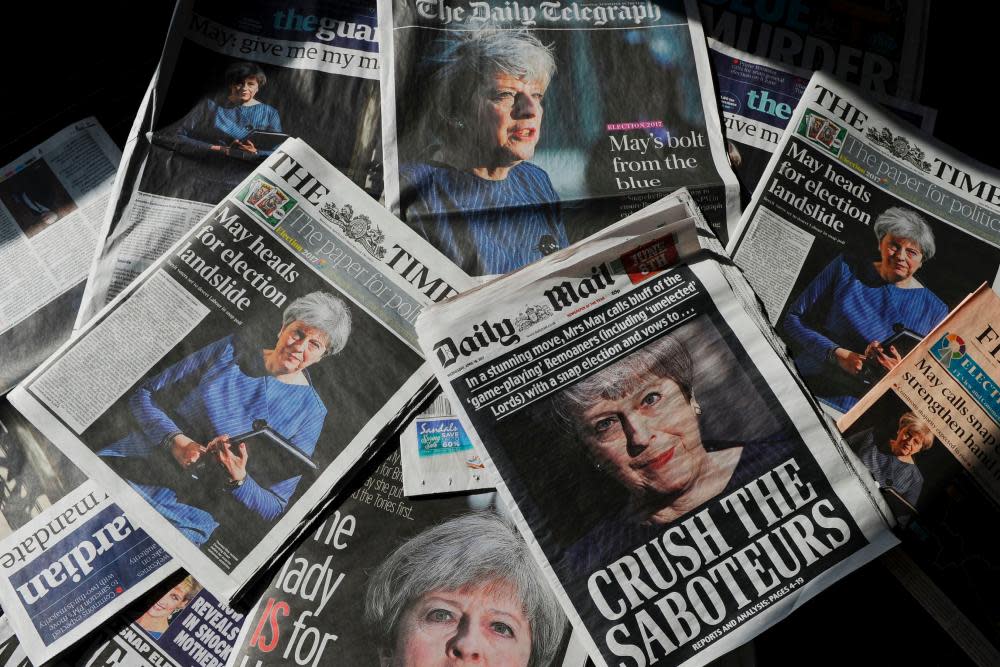The PM hopes she can rely on the press. But there’s one catch…

Elections are won and lost in the newsbreaks between songs on the radio. BBC Radio 2 alone attracts a greater number of weekly listeners than the number of those who voted Conservative at the last general election.
But what appears in newsbreaks is driven by what news producers read at morning conference, which is driven by the day’s papers, which in Britain overwhelmingly tilt to the right. Theresa May can rely on her allies in the rightwing press – the Telegraph, Express, Sun and Mail, with whose readers she has an instinctive and deep sympathy – to largely repeat what she says, which then finds its way from news pages to TV and radio.
Downing Street plans a campaign designed to produce good clips for the six o’clock news and soundbites for radio, as well as plenty of pictures and the odd interview, mostly chosen with the expectation that they will give the prime minister an easy ride.
That dynamic is already at work, even though the campaign is only days old. May claims that the election is being held because the opposition parties could block the Brexit deal.
The truth, though, is that May’s problem isn’t Brexit: it’s everything else. Her flagship education reform – the introduction of grammar schools – cannot get past the Cameroon tendency in the Commons and is dead on arrival in the Lords, as she has no manifesto pledge to protect it. The row over the budget shows that even a tax rise that is popular in the country cannot overcome the objections of the Tory right. On almost every issue of substance, there is a disgruntled Conservative faction that is larger than May’s Commons majority. On Brexit, however, she can count not only on her own party, but on the Northern Irish Unionists.
Labour, led by a Eurosceptic who has voted against every important European treaty to come before the Commons, who is opposed internally by backbenchers who fear that frustrating the referendum result will cost them their seats, has neither the ability or the inclination to stop Brexit. The Liberal Democrats may have the inclination, but with only nine MPs they do not have the ability. If anyone threatens Brexit, it is May, with an early election that could herald a Remain fightback.
But that won’t be what you read in the rightwing press, who all reliably parroted the May line. On this occasion, the Mail went too far even for May, for a change, describing the contest as an opportuntity to “crush the saboteurs”.
Labour hopes to circumnavigate the print press through the use of social media, where the party can tailor its message to fit the desires of each voter group, thanks to Facebook and the vast stores of data the company has on all its users. Broadcast laws compel both sides to be given equal airtime, so at least Corbyn will have his moment in the sun. However, the commitment to balance also helps the right. As far as the bulk of economists are concerned, the merits of the Conservative approach to deficit reduction are not a matter of debate – they simply don’t work. But on the airwaves, Philip Hammond and John McDonnell’s plans will be discussed as if they were of equal worth and weight.
That false equivalence, however, is a better ride than Corbynism will get in most of the papers, which also won’t hesitate to magnify and disseminate whatever skeletons the Conservative attack team have found in Corbyn’s cupboard. But there is one arena in which they will not be as gentle as May would like: her objective to use the election to slough off the commitments that David Cameron made in haste to see off Ed Miliband.
Downing Street’s desire to free itself of George Osborne’s commitment not to increase income tax, national insurance or valued added tax is good economic sense, but it offends the interests of conservative media bosses. The continuation of the triple lock on pensions is an expensive bribe that is no longer needed thanks to the party’s mammoth lead among retired people. Just as with elections, with regard to Britain’s ageing population, the rightwing media relies on the custom of elderly people to stay afloat, and will be forced to campaign, at least a little, in its readers’ interests.
And the interests of newspaper readers and owners will combine to mean that even May’s loudest allies will find cause to dissent from time to time. The business of newspapers is news, after all. Even as the rightwing press amplify May’s message, they will be keen to present Labour as a party capable of winning and wielding power. In that sense, if no other, they will be a greater ally for Labour and the Lib Dems than many suppose.
Stephen Bush writes for the New Statesman

 Yahoo News
Yahoo News 
